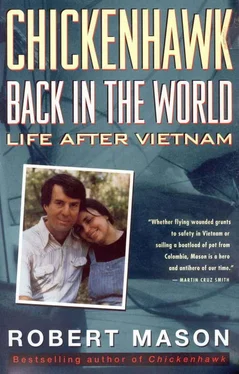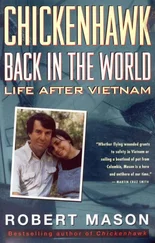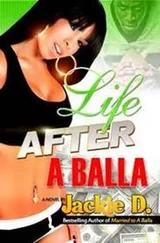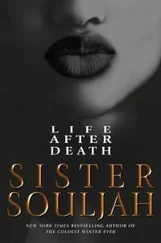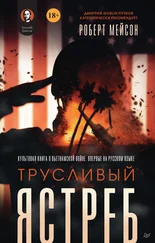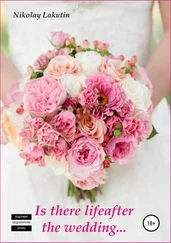Electricity jolts down my spine.
Calm down.
I swallow a gulp of bourbon.
Your war is over.
Fit in.
Wake up. Get out of bed. Waves of fear shoot through my head. Walk to kitchen, eyes swollen slits. Pour three fingers of Old Granddad. Swig that down, watching cars filled with lucky commuters bored senseless on Archer Road. Another Old Granddad. Feel fine now. Arrive at eight o’clock English class with warm whiskey sloshing mercifully through my brain. No one notices. Alcohol is good; it enables me to appear normal among normal people.
During my previous student career, my English composition teachers had been myopically interested in grammar. I thought they missed the point—grammar’s important, but look what I’m saying. My new English teacher, Yvonne Dell, though interested in grammar, was more interested in my stories.
One story, “Keith’s Ridge,” is about a teenage kid who sits and stares at grass waving in the breeze a little too long. He starts to see a pattern in the waves, starts to see the pattern as the signs of an invisible entity. When he follows this thing to Keith’s Ridge, he is pushed and tugged by strong swirls of wind. He takes the grabbing and pushing as caresses of acceptance right up until he’s flung off the cliff. Great story. Dell liked it, asked me if I ever tried to sell anything. I said I’d sent in that one, got a very nice rejection slip. You only tried once? she asked. Yep. I figure these guys know good stuff when they see it. Dell said I should keep trying. I had talent.
I got an A in English—my first in college. I did well in all my classes, finishing my first quarter with a 3.2 average. Grissom was pleased.
My major was fine arts, and within fine arts, I began to specialize in photography. I had won an Army photography contest with one of my prints. I thought photography might be the talent to replace flying. My instructor was Jerry Uelsmann. I’d seen him around when I was here the first time. He was just the photography instructor in 1962; now he was a celebrity in the art world, famous for his surreal pictures. He called his technique “post-visualization,” which meant he composed his photographs after collecting many negatives and then combined them in one flawless print. Uelsmann had the highest technical abilities, but that’s not what sold his pictures—they’re magically arresting images, photographs that Magritte might have made—boulders float over the sea; women are embraced by incandescent spheres. Unlike Uelsmann, I did “now-visualization.” I liked putting the picture together in the viewfinder. There is one magic point of view that feels right, makes a picture work, and I was finding them. Uelsmann said he liked my stuff: pictures of empty park benches and abandoned toys, empty houses. He said he liked the emotion in them. I was communicating. I got top grades in his class.
I never used the school’s darkrooms to make my prints. I preferred to work alone in the three-by-six-foot closet in our apartment I’d converted into a darkroom. When I came home from classes, I disappeared into this unventilated sweatbox with a bottle of whiskey, and printed photographs. When Patience had people over to visit, I stayed in the closet.
It was getting difficult to concentrate, difficult to see what the point was: these photographs, going to school. Not enough whiskey to make sense of it. Half a quart a day was not enough; was still jumpy; couldn’t think; couldn’t sleep; was getting worse. Shrink at Wolters had said I could go to the Veterans Administration and get Valium if I needed it. But, he said, “You should be fine after you get out. Being in the Army with the threat of going back to Vietnam is your problem.” Wrong. I was out of the Army, couldn’t go to Vietnam. Was still nuts. I went to the VA hospital to get Valium. Not so fast; we have procedures here. Had to be evaluated. Evaluation: talk to shrink for two hours.
I kept seeing student demonstrators on campus yelling about soldiers doing the wrong thing going to Vietnam. I got mad. Why, shiny-faced, draft-deferred twerps, are you sending them?
Patience was working nights to supplement the $145 a month I got on the GI Bill to go to school. It would’ve been $125 a month, but I had a wife and kid to support, so I got a twenty-dollar bonus for Jack and Patience. The GI Bill didn’t pay for the books, supplies, and the tuition like it did after World War II. (The rate and extent of our benefits was established by World War II veterans who thought we were using rubber bullets and special effects in Vietnam. Getting wounded or killed in this wimpy war just wasn’t as serious as it was in World War II.) Patience slept late. I waited for her to get up and make lunch. She made tuna fish salad better than I did, I told her.
Was drinking almost quart a day. Kids showed me marijuana at parties. Made me cough.
End of second quarter, grades dropped. Grissom said I’d better shape up soon. Grissom was right. Grissom was a veteran of World War II; he knew what was going on.
Veterans Administration sent me the results of my evaluation: I was fifty percent disabled for nervousness. I was afraid to tell anyone about my wimp disability. VA sent a check, back pay from the day I left the Army, invited me to come in for treatment:
What did you do in Vietnam?
Flew assault helicopters in the First Cav Division.
Dangerous?
Well, yeah—
How did you get along with your mother?
Huh?
Gave me Valium. Took five, six a day; drank the whiskey; smoked the pot. The Valium calmed me down, but only if I used it with the rest of the drugs.
I kept up my photography. One of the students at Schucht Village, a doctor named Merle Preble, asked me if I would show my pictures at the VA where he did some intern work. I put together a one-man show at the VA hospital library. Not a big deal, this show, but I watched a woman cry at one of my photographs and got a peek at the power of communication.
The leathery cadavers in the dissection lab weren’t what I was looking for; they weren’t human anymore, just objects kept in tanks of chemicals you studied to see how people are put together. I wanted to see the morgue.
Preble pushed open a heavy metal door, the kind you see on walk-in coolers. Inside the frigid room, feeble lavender light from ultraviolet lamps flickered, barely piercing the gloom. The floor was jammed with gurneys crowded every which way, burdened with bodies covered with strangely hazy glowing sheets. Naked dead people, hunched over inside big plastic bags hung along the wall, seemed to glower at me for staring.
Uelsmann assigned us the theme of death to explore with pictures. I’d seen lots of men slaughtered and it looked painful. I was afraid of it, so I thought this assignment might help me overcome my fear. I photographed myself, whitened with talcum powder, arms clasped on my chest, lying as if in state, so I could see what I would look like in the coffin. Pretty gruesome, but not very real. I asked Preble to get me into the medical school’s dissection laboratories and morgue with my camera. He said sure, and we went to the hospital late one night.
“Who are they?” I asked, looking at the people in the bags.
“Regular people. Died in the hospital,” Preble said. He looked at me. “You okay?”
“Yeah.” I was feeling weak, but I wanted to fight through it.
“Can you photograph in here?” Preble asked. “It’s real dark.”
I pointed my meter at the wall, at a man in a bag. His arms were together in front of him, his head slumped forward. I could feel him decaying. The cold room smelled sweet and stale. Concentrating on my work, I moved inside, squeezing between gurneys. The meter said it was real dark; I would have to use a slow shutter speed. I took a couple of shots of the man. I thought I saw his face move when the shutter clicked. My hand brushed a sheet and I felt heat. I jerked away and looked at Preble. “This one’s still warm!”
Читать дальше
